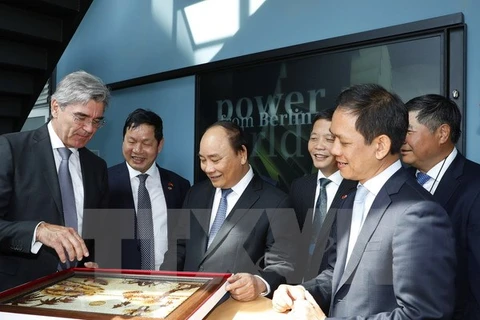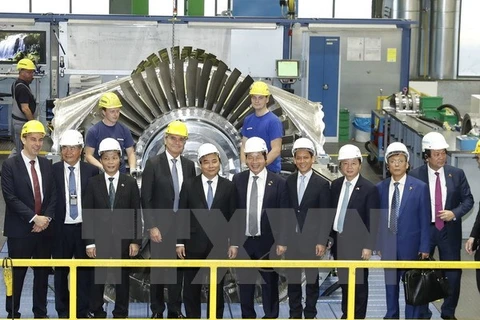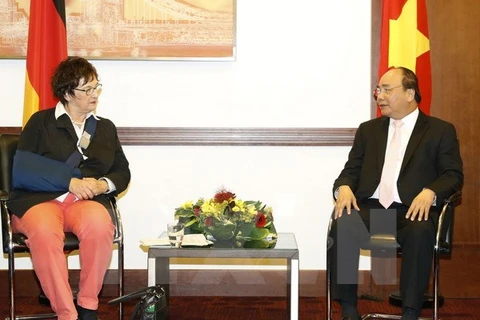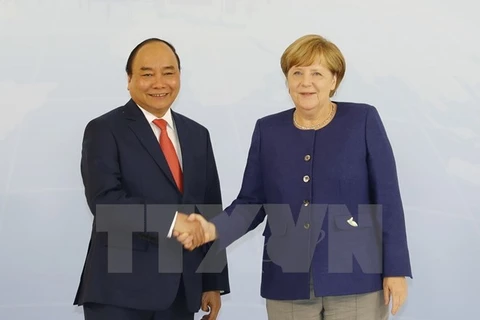Berlin (VNA) – Prime Minister Nguyen Xuan Phuc has expressed his desire that Germany, as the largest economy and an influential member of the European Union (EU), would help attract global resources into Vietnam, particularly in mechanical engineering, automation, vocational training and tertiary education.
Addressing the Vietnam-Germany Business Forum in Berlin on July 6 with nearly 600 German firms and more than 100 Vietnamese partners taking part, the PM said the two countries established a comprehensive strategic partnership in 2011. Germany is Vietnam’s top trade partner in the EU, with two-way trade hitting 9 billion USD in 2016, or 20 percent of Vietnam-EU trade.
Major German businesses such as Siemens, Mercedes and Deutsche Bank have poured 1.8 billion USD in Vietnam. The Vietnam-Germany University (VGU) in the southern province of Binh Duong and several schools opened by German firms in Ho Chi Minh City help Vietnam improve workforce quality and deal with issues regarding energy, transport, environment resources, urban planning and sustainable development.
Since the Goethe Institute opened in Hanoi in 1997, bilateral cultural exchanges have been strengthened. More than 100,000 Vietnamese have graduated from German universities, he said.
Informing German investors about Vietnam’s economy, Phuc said Vietnam’s gross domestic product (GDP) has grown more than 6 percent for 30 consecutive years, rising 6.21 percent to 220 billion USD last year. With increasing consumption and average income per capita of nearly 2,300 USD, Vietnam’s trade value of roughly 400 billion USD is about 1.6 times higher than GDP.
Vietnam is home to 23,160 foreign-invested projects from 120 countries and territories worth more than 320 billion USD, many of them from German corporations.
Vietnam’s business climate has improved, up nine places from 91st to 82nd among 190 countries worldwide in the World Bank’s Doing Business rankings 2016-2017.
According to the World Economic Forum, Vietnam ranked 60th out of 138 countries in competitiveness. The nation has also signed 12 free trade agreements, as part of global integration commitments.
It has also cleared barriers in many sectors, including services, telecommunications and finance-banking, by raising foreign ownership caps or selling State-owned enterprises’ strategic stakes.
Vietnam is working to waive licenses to open securities accounts for foreign investors and clear capital control measures which are contrary to international practices.
The domestic banking system is being restructured to meet modern banking standards in line with international practices.
Mergers and acquisitions have also been sped up in infrastructure, transport, airport, highway, seaport, electricity, telecommunications, food, agriculture and services.
The country also boasts many leading Asian trademarks such as Vietnam Airlines, Vietjet Air, Petrolimex, Vinamilk, Masan, TH Truemilk, Trung Nguyen coffee, Mobiphone and Vietcombank, among others.
The PM noted that Germany’s technology and governance experience will help Vietnam during the industrial revolution 4.0.
Vietnam wished that the European country would encourage German investment in the support industry, as well as joint-ventures in renewable energy such as solar and wind energy.
German firms hoped that the Vietnamese government would continue fine-tuning laws and improving the business climate.
The German House project in Ho Chi Minh City and VGU are also expected to create a strong driving force for bilateral economic-trade ties.
In her speech, Federal Minister for Economic Affairs and Energy Brigitte Zypries hailed Vietnam for its vibrant growth and large, young workforce. She affirmed that Germany will be always a trustworthy partner of Vietnam.
Both sides also vowed to lift two-way trade to 20 billion USD from 14 billion USD at present.
Twenty-eight cooperation documents worth over 1.5 billion EUR were signed during the event.
Following the event, the leader met executives of several German corporations and banks and expressed hope that they will soon launch operations in Vietnam.
In the evening the same day, PM Phuc left Berlin for Hamburg city, starting activities within the framework of the G20 Summit.-VNA
Addressing the Vietnam-Germany Business Forum in Berlin on July 6 with nearly 600 German firms and more than 100 Vietnamese partners taking part, the PM said the two countries established a comprehensive strategic partnership in 2011. Germany is Vietnam’s top trade partner in the EU, with two-way trade hitting 9 billion USD in 2016, or 20 percent of Vietnam-EU trade.
Major German businesses such as Siemens, Mercedes and Deutsche Bank have poured 1.8 billion USD in Vietnam. The Vietnam-Germany University (VGU) in the southern province of Binh Duong and several schools opened by German firms in Ho Chi Minh City help Vietnam improve workforce quality and deal with issues regarding energy, transport, environment resources, urban planning and sustainable development.
Since the Goethe Institute opened in Hanoi in 1997, bilateral cultural exchanges have been strengthened. More than 100,000 Vietnamese have graduated from German universities, he said.
Informing German investors about Vietnam’s economy, Phuc said Vietnam’s gross domestic product (GDP) has grown more than 6 percent for 30 consecutive years, rising 6.21 percent to 220 billion USD last year. With increasing consumption and average income per capita of nearly 2,300 USD, Vietnam’s trade value of roughly 400 billion USD is about 1.6 times higher than GDP.
Vietnam is home to 23,160 foreign-invested projects from 120 countries and territories worth more than 320 billion USD, many of them from German corporations.
Vietnam’s business climate has improved, up nine places from 91st to 82nd among 190 countries worldwide in the World Bank’s Doing Business rankings 2016-2017.
According to the World Economic Forum, Vietnam ranked 60th out of 138 countries in competitiveness. The nation has also signed 12 free trade agreements, as part of global integration commitments.
It has also cleared barriers in many sectors, including services, telecommunications and finance-banking, by raising foreign ownership caps or selling State-owned enterprises’ strategic stakes.
Vietnam is working to waive licenses to open securities accounts for foreign investors and clear capital control measures which are contrary to international practices.
The domestic banking system is being restructured to meet modern banking standards in line with international practices.
Mergers and acquisitions have also been sped up in infrastructure, transport, airport, highway, seaport, electricity, telecommunications, food, agriculture and services.
The country also boasts many leading Asian trademarks such as Vietnam Airlines, Vietjet Air, Petrolimex, Vinamilk, Masan, TH Truemilk, Trung Nguyen coffee, Mobiphone and Vietcombank, among others.
The PM noted that Germany’s technology and governance experience will help Vietnam during the industrial revolution 4.0.
Vietnam wished that the European country would encourage German investment in the support industry, as well as joint-ventures in renewable energy such as solar and wind energy.
German firms hoped that the Vietnamese government would continue fine-tuning laws and improving the business climate.
The German House project in Ho Chi Minh City and VGU are also expected to create a strong driving force for bilateral economic-trade ties.
In her speech, Federal Minister for Economic Affairs and Energy Brigitte Zypries hailed Vietnam for its vibrant growth and large, young workforce. She affirmed that Germany will be always a trustworthy partner of Vietnam.
Both sides also vowed to lift two-way trade to 20 billion USD from 14 billion USD at present.
Twenty-eight cooperation documents worth over 1.5 billion EUR were signed during the event.
Following the event, the leader met executives of several German corporations and banks and expressed hope that they will soon launch operations in Vietnam.
In the evening the same day, PM Phuc left Berlin for Hamburg city, starting activities within the framework of the G20 Summit.-VNA
VNA

























